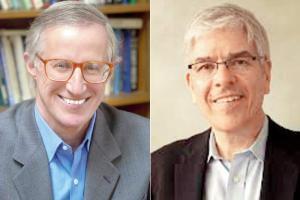The Nobel economics prize wraps up the 2018 awards season, notable this year for the lack of a literature prize, postponed by a year for the first time in 70 years over a rape scandal that came to light as part of the #MeToo movement

William Nordhaus and Paul Romer
US economists William Nordhaus and Paul Romer on Monday shared the 2018 Nobel Economics Prize for integrating innovation and climate with economic growth, the jury said. Nordhaus, a professor at Yale University, and Romer, a former World Bank chief economist now at New York University's Stern School of Business, have addressed "some of our time's most basic and pressing questions about how we create long-term sustained and sustainable growth," the Royal Swedish Academy of Sciences said in a statement.
ADVERTISEMENT
It said the pair have "significantly broadened the scope of economic analysis by constructing models that explain how the market economy interacts with nature and knowledge." Nordhaus, 77, was specifically honoured for "integrating climate change into long-run macroeconomic analysis." The 62-year-old Romer meanwhile won for "integrating technological innovations into long-run macroeconomic analysis." Both have been tipped as frontrunners for the Nobel in recent years.
The pair will share the nine million Swedish kronor (about $1.01 million or 860,000-euro) prize. Last year, the honour went to US economist Richard Thaler, a co-founder of the so-called "nudge" theory, which demonstrates how people can be persuaded to make decisions that leave them healthier and happier.
Unlike the other Nobel prizes which were created in Swedish inventor and philanthropist Alfred Nobel's last will and testament and first awarded in 1901, the economics prize was created by the Swedish central bank, the Riksbank,in 1968 to mark its tricentenary. It was first awarded in 1969. The Nobel, which also consists of a diploma and a gold medal, will be presented at a formal ceremony in Stockholm on December 10.
The Nobel economics prize wraps up the 2018 awards season, notable this year for the lack of a literature prize, postponed by a year for the first time in 70 years over a rape scandal that came to light as part of the #MeToo movement. Last week, after the prizes for medicine, physics and chemistry were announced, the most highly-anticipated Nobel, that for peace, went to Yazidi women's campaigner Nadia Murad and Congolese doctor Denis Mukwege for their work in fighting sexual violence in conflicts around the world.
Catch up on all the latest Crime, National, International and Hatke news here. Also download the new mid-day Android and iOS apps to get latest updates
This story has been sourced from a third party syndicated feed, agencies. Mid-day accepts no responsibility or liability for its dependability, trustworthiness, reliability and data of the text. Mid-day management/mid-day.com reserves the sole right to alter, delete or remove (without notice) the content in its absolute discretion for any reason whatsoever
 Subscribe today by clicking the link and stay updated with the latest news!" Click here!
Subscribe today by clicking the link and stay updated with the latest news!" Click here!







